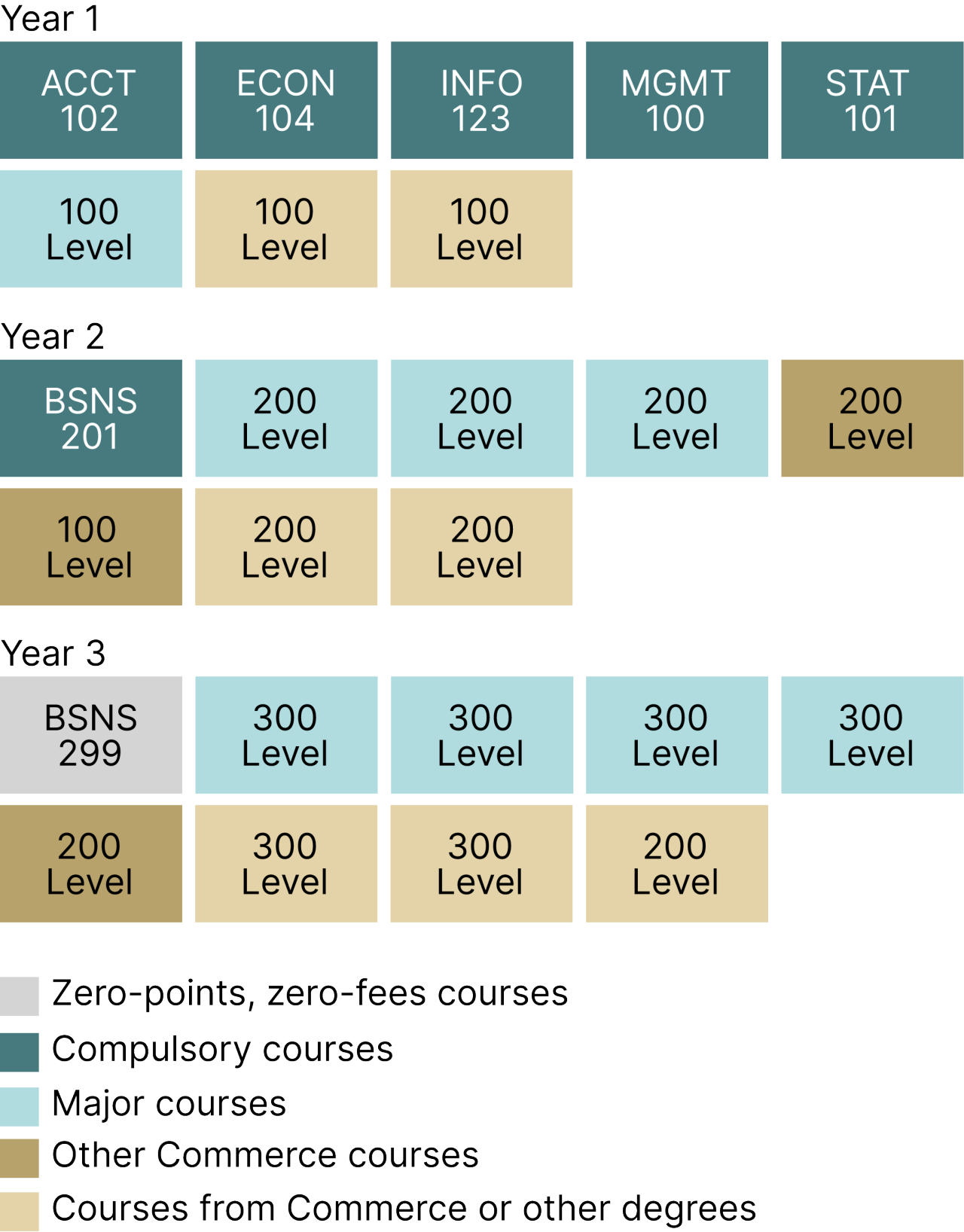Bachelor of Commerce
- Degree Structure - Duration
- 3 years full-time

A Bachelor of Commerce (BCom) gives you the knowledge and skills you need to succeed in a global business environment. From financial markets to the latest management practices and the rapidly expanding world of e-commerce, find out about studying a BCom through Te Kura Umanga | UC Business School.
360
2024 tuition fees estimate per 120 points:
From financial markets to the latest management practices and the rapidly expanding world of e-commerce, a BCom gives you the knowledge and skills to succeed in a global business environment.
UC and its business partners provide many opportunities for you to gain practical business experience and make important contacts.
Admission to UC with University Entrance (or equivalent) is required to enrol.
If English is your additional language, you are also required to meet UC's English language requirements.
See Admission and enrolment for all information on enrolling at UC.
Anyone with entry to the University can study a BCom from 100-level without previous study in the area. However, it is useful to have studied accounting, economics, business studies, and mathematics (especially statistics) at secondary school.
If you have achieved top results in accounting and/or economics at secondary school you may be eligible for direct entry to some 200-level courses.
A good standard of spoken and written English is important.
The Bachelor of Commerce is a highly flexible degree that allows a wide range of choices from major and minor subjects, as well as courses from other degrees.
You will complete at least one major subject, and can also choose to specialise in a minor subject.
See ‘Planning my degree’ below for an example degree structure diagram.
The BCom includes five 100-level compulsory courses in the first year:
These courses provide a good general business background and are required for entry to some 200 and 300-level courses. However, you can complete some of these courses in your second and third years depending on the requirements of your major.
You will also take compulsory courses beyond your first year, which will develop knowledge in the business cultural environment and give formal recognition of work experiences through UC study:
As a Bachelor of Commerce student, you may have the chance to integrate work and international experiences into your study through:
Places on these programmes are limited and may depend on your academic performance. Talk to a Student Advisor to know more.
UC has a wide range of options for graduate and postgraduate Commerce study.
Find out more about what can you do with a degree from UC.
2024 tuition fees estimate (per 120 points):
2023 tuition fees estimate (per 120 points):
SSL estimate (per 120 points):

Each small block represents a 15-point course. However, some courses may be 30 points or more.
This diagram is an example only – other combinations are possible. For specific course requirements, see the Regulations for the Bachelor of Commerce.
The Bachelor of Commerce degree requires a minimum total of 360 points:
A minimum of 225 points must be from courses above 100-level, with at least 90 points at 300-level.
The degree takes 3 years of full-time study, or can be studied part-time for up to 10 years.
For the full degree requirements, see the Regulations for the Bachelor of Commerce.
BCom students have the option of completing either:
Each major has specific course requirements, but all consist of a minimum 120 points, with at least 60 points at 300-level.
A minor consists of a minimum of 75 points, including at least 45 points above 100-level, in a single subject chosen from Commerce, Arts, Digital Screen, Health Sciences, Product Design, Science, Sport, or Youth and Community Leadership degrees.
It is possible to study a Bachelor of Commerce alongside other degrees at the same time, such as the Bachelor of Science or Bachelor of Forestry Science.
Find out more information about Double degrees.
You can study a conjoint degree and merge your Bachelor of Commerce with options such as the Bachelor of Arts or Bachelor of Product Design, so that you can complete major subjects from multiple areas in a shorter timeframe.
Find out more information about Conjoint degrees.